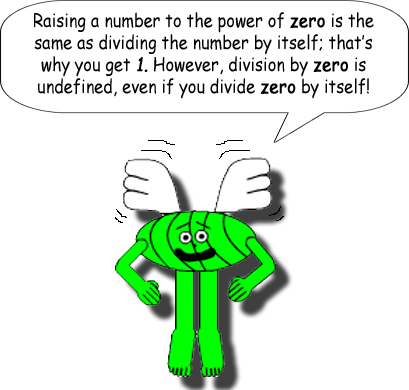Multiplication Vs. Division By Zero
This math trick shows an example why division by zero is undefined. Consider this algebraic equation:
N = 2N
The only way the equation above can be true is if N = 0. However, if you divide 2N by N, then you should get:
N/N = 2N/N = 1 = 2

Right? However, 1 ≠ 2; 1 = 2 is a false statement! But it would be true if 0 ÷ 0 = 1, which it doesn't. (By the way, remember this rule of logic: falsity implies anything!) Whenever you multiply by zero, you always get zero. Dividing zero by itself is indeterminate because of how multiplication by zero works. Division by zero should give you infinity according to the graph of the function y = n/x (the variable n can be any number you want) but infinity is technically not a number! Infinity can cause strange things to happen, too!
One more thing: since...
log 1 = 0 & log 0 is undefined
The number 1 cannot be used as a base of a logarithm; neither can zero. Because:
1^x = 1, no matter what x is
and
0^x = 0 if x > 0; if x ≤ 0, then 0^x is undefined
When you raise a number to a negative power, you're dividing; raising to a positive power is multiplying! Exponentiation is glorified multiplication or division!

Division by zero creates a mathematical fallacy, as you just seen on this Web page.
Back to Index Page Back to Math Trick Menu
© Derek Cumberbatch


